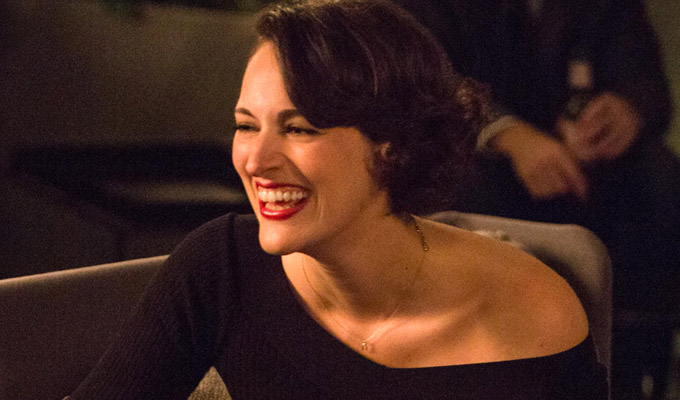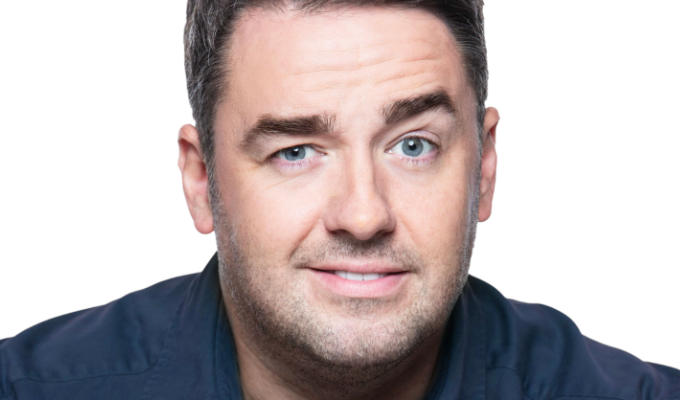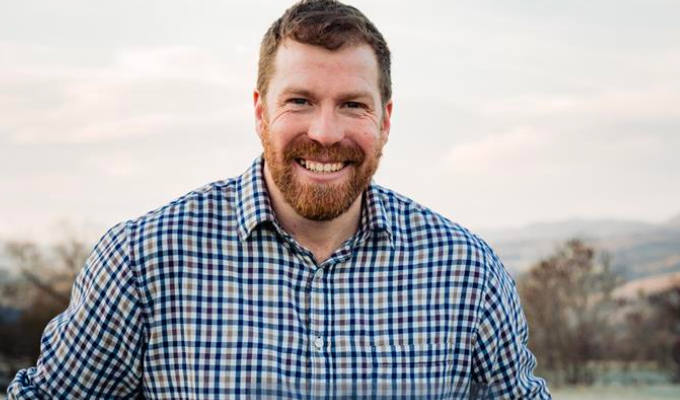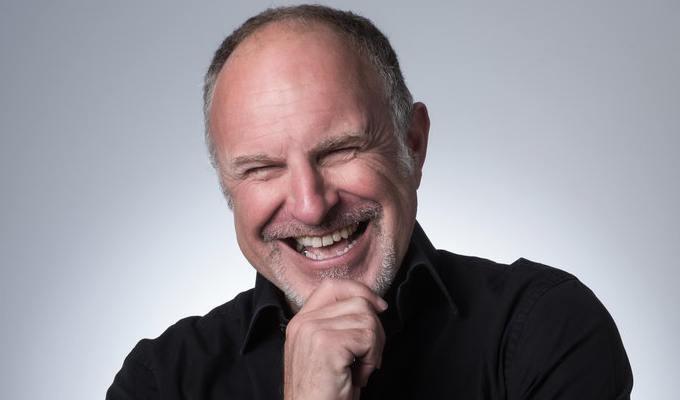
‘Hope has so much to do with writing'
Phoebe Waller-Bridge reveals the inside story of Fleabag
Fleabag has won countless plaudits for its razor-sharp writing, with every line bursting with wit and honesty.
Now Phoebe Waller-Bridge has spoken about how she agonised over some parts of the script… while others she hastily rewrote just minutes before crucial scenes were to be filmed.
In fact, two of the most memorable scenes in the second series - the lead character’s confession (which has been nominated for Bafta’s 'Must-See Moment' award) and her misogynist brother-in-law Martin’s self-pitying plea to save his marriage - were changed at the very last minute.
Of the confession scene, Waller-Bridge said: ‘I was rewriting on the day. She wasn’t originally going say, "I didn’t have a miscarriage", that was going to come out later.
‘But I realised that was the perfect moment for it. It was so frightening because obviously it was now … when was there ever a moment it wasn’t going got be now?’
Speaking at a virtual Bafta masterclass session last night, Waller-Bridge also revealed that director Harry Bradbeer also changed the tone of the scene.
‘Harry really felt Fleabag needed to get emotional and cry in that scene, but in the writing I felt that she was quite hardened a that point,’ she said.
‘We didn’t have very long to shoot it so we had maybe three, four takes. I’ve rewritten it two minutes before so I’m trying to remember my lines and I feel like I need to get the take I had in my heart when I was writing it.’
But she said Bradbeer was insistent that at least one take was shot his way, and conceded. ‘ Sometimes you need to let go of the image you have and give it a go. So I did, and it was the best take by a million miles. He was right.’
Waller-Bridge also told how she had the opening scene for the second series set in her mind very early on.
‘The first image I had ever when thinking about the second season was that whole opening scene with Fleabag looking up [with] blood down her face,’ she said. ‘I had no idea what had happened, I just knew that’s how it’s opening.

‘That’s often how it works. You get these really strong images, and the fun bit is piecing together the puzzle of what feels right instinctively about that image and figuring out why that image feels so right.’
She confessed that she wrote ‘many terrible drafts of terrible versions of the first episode’ before settling on the dinner party she had originally planned for a later episode.
‘I started writing the episode and it just started pouring out,’ she said. ‘It seemed like the clearest way to feel the tensions without having to explain them to people. The whole vibe of Fleabag for me is people trying to pretend they are OK when they are not OK, and there is nothing like a family dinner party to put that pressure on people.’
Bradbeer added that he was ‘channelling Goodfellas’ in shooting that scene, likening ‘this family that are all smiles but are going to stab you’ to the mafia.
Waller-Bridge added that for the whole arc of the second series: ‘It felt early on like it should be a love story but even that took some grappling…’
‘I realised there should be a character who Fleabag can’t just sum up in a quick line. The whole first series is her describing people as Tube Rodent or Arsehole Guy and she considers herself able to see people very quickly at their core and it was very exciting to meet someone she can’t define.
‘She tries to. She says "cool, sweary priest" at the beginning [when she first meets Andrew Scott’s religious character and her love interest]. But I really wanted to find someone who could match her her in intelligence and perceptiveness. Then also by making him a priest and a man of faith and a celibate man just made the whole thing even more tense for obvious reasons.

‘Every time I was trying to write him, it just felt like it was almost too much like a sitcom setup: a girl who was obsessed with sex in the first season as a way of validating herself, meeting a man who can’t do that.
‘But the moment the idea of Andrew came into my head, he instantly became complex and interesting.’
And off the ‘hot priest’ monicker, she protested: ‘I didn’t call him the hot priest, the internet did! In the script the character was always called Priest. After all my years complaining that women in scripts are described like "Sandra, beautiful, walks into the room"….’
Waller-Bridge also reflected on how him communicating with God mirrored the asides-to-camera her character is famous for.

‘She’s witnessed by the camera the whole way through, and in the end, the big question for her is whether or not she can let go of the camera,’ the actress and writer said. ‘It’s that pressure of being watched and feeling like if you’re not being witnessed, does what you’re doing count for anything, does it matter? But then, the flip side of that is: if you’re constantly witnessed… you’re too frightened to slip up or let someone see you be vulnerable.
‘So she’s constantly grappling with this need for the audience to be there, to validate her, and also to leave her alone so she can experience things on her own. So, for me, it was more about that.’
‘And he [the priest] is witnessed by God the whole time… and in the end he has the same question, so I just felt like it would be a really good way to mirror each other’s journeys.’
Although her scripts brim with confidence, Waller-Bridge admitted: ‘I’m constantly doubting. There are some things that I’m 1,000 per cent sure of and that’s not even 20 per cent [of the total]. The rest of it I’m constantly questioning and doubting.’
Of rewriting the speech given by Martin at the last minute, Waller-Bridge recalled: ‘The speeches were all pretty much there from the beginning except for Brett Gelman’s speech at the wedding when he’s talking to [his wife] Claire (Sian Clifford). That was rewritten very, very last minute because that didn’t feel right.
‘I was in the car driving to set with Brett, who’s such a hero for this… We had five minutes before getting to set. He’s done loads of improv, he’s a comedian he’s so up for it. He was like "let’s do it, rewrite it!"
‘I realised I’d written this Fleabaggy monologue… it was tipping too close to Fleabag, so I began rewriting it in the car on pieces of paper and Brett was reading it out as I was writing it and practising and practising. He basically walked out on to the set and we had to tell everyone it had "slightly" changed. Brett just delivered four takes of this speech he’d learned two minutes before.’
Another memorable scene is at the end of the series, when a heartbroken Fleabag is sitting forlornly at a bus stop and a fox walks by.
‘The fox had to be in it, and that was a huge challenge,’ she said. ‘That wasn’t necessarily part of the plot - you could leave it and the series would still make sense - but at the same time it’s a magical moment that I can’t quite describe why it has to be there.’
Yet it proved a nightmare to shoot, as producer Sarah Hammond recalled.
‘We had two ways of doing it,’ she said. ‘One was to do VFX [computer-generated visual effects] which is cripplingly expensive. So we did try with a real fox first because that was a slightly more in-budget option.
‘The fox was misbehaving, it was up against the clock and a bit mad. But it was one of my favourite moments of the shoot. We all love Buttercup the fox!
‘This fox had travelled all the way down from Oxford, it was very much a country fox. Buttercup was shy and didn’t want to come out of her box. We were well into overtime and I remember the focus-puller saying, "I’ve worked with this fox before it’s never coming out of the box".
‘The handler was playing Magic FM to soothe it. It was Coldplay and then it was Dido [singing] ‘I will go down with this ship’. The fox never came out, unfortunately. It was very funny!’
They had better luck with other animals. ‘Hilary the guinea pig was with us since series one,’ Hammond recalled. It’s perfect because she’s got exactly the right tufty crest of hair. We were worried we we were going to have to wig a new guinea pig if we recast. And Stephanie the hamster was also delightful and very well-behaved.’
Equally delightful, and hopefully just as well-behaved, was Olivia Colman, playing Fleabag’s stepmother - quite the coup for what was originally a modest BBC Three comedy.
Waller-Bridge explained they had been pals since appearing in a play together. After Colman saw the stage version of Fleabag, she told her former co-star: ‘I really love it and if you ever write anything and you want me to be in it let me know’
‘When I told the producers that Olivia said she would be in it if there was a part for her, they were like, "make a part from her!"’ Waller-Bridge recalled. ‘She’d always wanted to play somebody unlike the warm natural energy that she has. She’s so mischievous, she wanted to have a mean streak and it grew out from there. I’m so lucky she was a friend and was willing.’
Finally, Waller-Bridge reflected on the phenomenal reception Fleabag has had from audiences, critics and the TV industry, saying the way her character resonated with viewers was nothing she could have anticipated.
‘I only know why I wanted to write her and my reactions to it, and the fire in me when I was writing it, which was "what If you say this? I don’t feel I’ve seen this perspective of a woman’s experience here…"
‘If I’m writing something that feels truthful and electric because it feels a bit truthful I hope it will land with other people, too.
‘Hope has so much to do with writing. When you’re writing you’re just hoping that it reaches people. you’re hoping that you’re not alone to think this is funny or this is moving.
‘You go in with all the hope int he world that it will resonate in this way and when it does it’s such a huge relief from a creative point of view and also from a human point of view. That you’re not completely alone on your island going, That’s funny right guys?"
Watch the full Zoom session with some of Fleabag's cast and crew here:
Published: 15 Jul 2020






